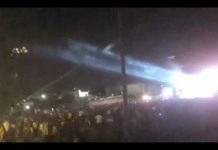Photo:Noam Bedein, Sderot Media Center
For a long time Israeli citizens, especially in the southern part of the country, were under missile and rocket fire from Hamas, the Islamic Jihad and their partners in the Gaza Strip. International and Arab public opinion ignored the attacks. But when Israel responded with Operation Pillar of Defense, the familiar ritual returned. European leaders were quick to give advice about the extent of the operation, while Arab leaders condemned Israel for bombing the missile launching sites and hidden weapons stores. Diplomatic contacts, led by Egypt, were established quickly in order to bring about an end to the fighting; in other words, a new tahadiya (period of calm).
It comes as no surprise that Hamas views the agreement that was reached with the help of the United States and the UN Secretary General as a victory. Crowds of Gazans took to the streets to celebrate their triumph, and the head of the Hamas political bureau, Khaled Mashaal, has already announced that his organization vanquished the Zionists. Hamas has indeed accepted the agreement, but it will violate it as soon as its current distress disappears. It will behave exactly like the prophet Mohammad did with the people of Mecca with whom he signed the treaty of Hudaybiyya. That agreement was supposedly for ten years, but, after two years, he felt strong enough to break it and to continue the war.
Hamas wanted to drag the IDF into a war in Gaza with many casualties. Hamas hoped to use tactics similar to those used by Mohammad and his followers in the 7th century Battle of the Trench, when the Muslims broke the infidels’ siege on the city of Medina and achieved victory.
The Palestinians relate to their problem as “the only just problem” in the world. According to their version, one shouldn’t talk about the suffering of other peoples, so that international attention won’t be deflected from their problem. They never mentioned the mass killings perpetrated by Hafez al-Assad in Hama, Syria; by Saddam Hussein against the Kurds in Halabja; by Omar al-Bashir in Darfur, Sudan; and, during the last two years, by Bashar al-Assad against his own people in Syria. They cheered cruel leaders (just as they once cheered Hitler), who support the Palestinians’ national ambition to destroy Jewish existence in this area.
Our natural predilection to cherish life and peace conflicts with the Muslim theology of holy war (jihad ) shared by al-Qaida, Hizbullah and Hamas. Due to the weakness of these organizations, their goals are limited to the constant harassment of Israel and the disruption of a tranquil daily life for its inhabitants. Their goal is not to achieve a conclusive military victory, since their struggle is not over territory, but rather the spilling of Jewish blood. A vision of death is the peak in the life of a Hamas activist, and Hamas leaders encourage their followers to fight to the death. They learn to fight for Islam and the establishment of the Islamic caliphate, which by definition has no borders. This is a long-term doctrine of war, and accordingly demands of us much patienceH
. In the meantime, we must explain to our friends in the world about the difficult reality in which we live.
Declarations of IDF strength and commentaries on its achievements in the struggle do not deter Hamas, because its war is not with the IDF but with Israel’s soft belly – the citizens in their homes and the pupils in their schools. This war, from the terrorist organizations’ point of view, is simple and cheap.
The failure to reach an agreement with the Palestinians is due to a fundamental problem of perception in the Palestinian mentality – of Fatah as well as of Hamas. Both refuse to accept a “Jewish entity” in the Middle East. Hamas objects to the mere presence of the State of Israel, whereas Fatah did recognize Israel as part of the Oslo Accords, but not as a Jewish state.
Zvi Gabay is a former ambassador and deputy director general of the Ministry of Foreign Affairs










